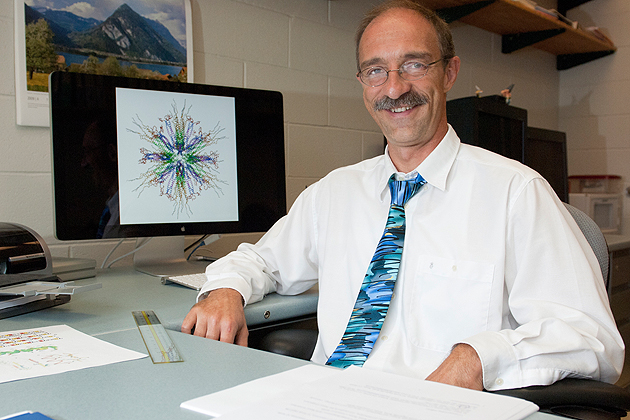
When Peter Burkhard first heard the idea of a nicotine vaccine eight years ago, he thought it was funny – how could a vaccine affect something that’s not technically a disease?
But the more he thought about the impact such a vaccine could have, the more it drew his attention.
“If you look at the consequences of cigarettes, it’s mind-boggling,” says the Swiss-born scientist. “Seven million people are killed by the causes of nicotine addiction every year. That’s like wiping out Switzerland, every year.”
Burkhard, an associate professor of molecular and cell biology in the College of Liberal Arts and Sciences, has just received a five-year, $2.5 million Avant-Garde Medications Development Award from the National Institutes Drug Abuse, a part of the National Institutes of Health, to develop and test a new vaccine for nicotine.
The vaccine, which borrows from the principles of how viruses stimulate the immune system, could eliminate addiction in people dependent on cigarettes and other tobacco products.
When you smoke, nicotine travels from your lungs to your blood, and finally to your brain, where it acts as a stimulant and produces a good feeling, or a “kick,” as Burkhard says. This is what makes it so addictive.
But if the immune system could be trained to recognize and bind nicotine molecules in the blood, before they reach the brain, then the addiction loop would be short-circuited, and people could more easily quit smoking, he says.
Burkhard, who is also a faculty member in the Institute of Materials Science, has been working on vaccines for diseases like malaria for the last decade. Like a vaccine for a disease, the nicotine vaccine would introduce a foreign substance – a virus-like particle with nicotine molecules attached to it – into the body. Because the compound looks to the immune system like a virus and thus appears to be potentially harmful, immune cells would generate antibodies that can specifically bind nicotine.
Once such antibodies are in circulation in the bloodstream, as soon as a person smokes a cigarette, the antibodies would bind the nicotine before it reaches the brain, preventing a buzz.
“This could work for people who are already addicted,” says Burkhard.
Scientists have been trying to create a compound that can do this for more than 20 years. But until now, the vaccine carriers used to present nicotine to the immune system have had limited success, generating sufficient antibodies in only 30 percent of people tested.
The promise of Burkhard’s new compound is its ability to provoke a response by the immune system. The immune system of humans recognizes pathogens that have three major features: they’re peptides (fragments of protein); they’re really tiny (less than a thousandth of the width of a human hair); and they have a repetition of the same peptide patterns on their surface.
Burkhard’s new carrier fits all these characteristics better than any previously used, which gives it an advantage.
“We have reason to think it will create a stronger immune response than the other carriers tested as nicotine vaccines,” he says.

The compound is made up of proteins that assemble themselves into a nanoparticle. But since it’s made of proteins, says Burkhard, the compound isn’t toxic like some other nanomaterials.
“It’s no different than any other protein your body uses on a daily basis,” he says. “You could eat it if you wanted to, and it wouldn’t harm you.”
Burkhard emphasizes that the vaccine would not protect against any other risks of tobacco use, such as lung cancer and heart problems. The goal, he says, is to help people quit by breaking their addiction to nicotine.
The goal of his grant will be to test the compound’s safety in clinical trials. These tests will observe different reactions to the drug to help the researchers optimize it for use in the general population.
Burkhard was only 29 when his older brother, a lifelong smoker, died of lung cancer. Even today, the numbers of nicotine-related deaths are staggering to him.
“If we manage to make a nicotine vaccine that works, that’s huge,” he says.
Burkhard will conduct his clinical trials with colleague and medical doctor Thomas Cerny, who is head of the oncology department at the hospital Kantonsspital St. Gallen in Switzerland. Two post-doctoral researchers will be hired to work on the project at UConn.
To learn more, go to the NIDA announcement page.



